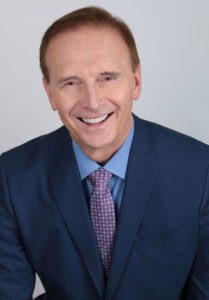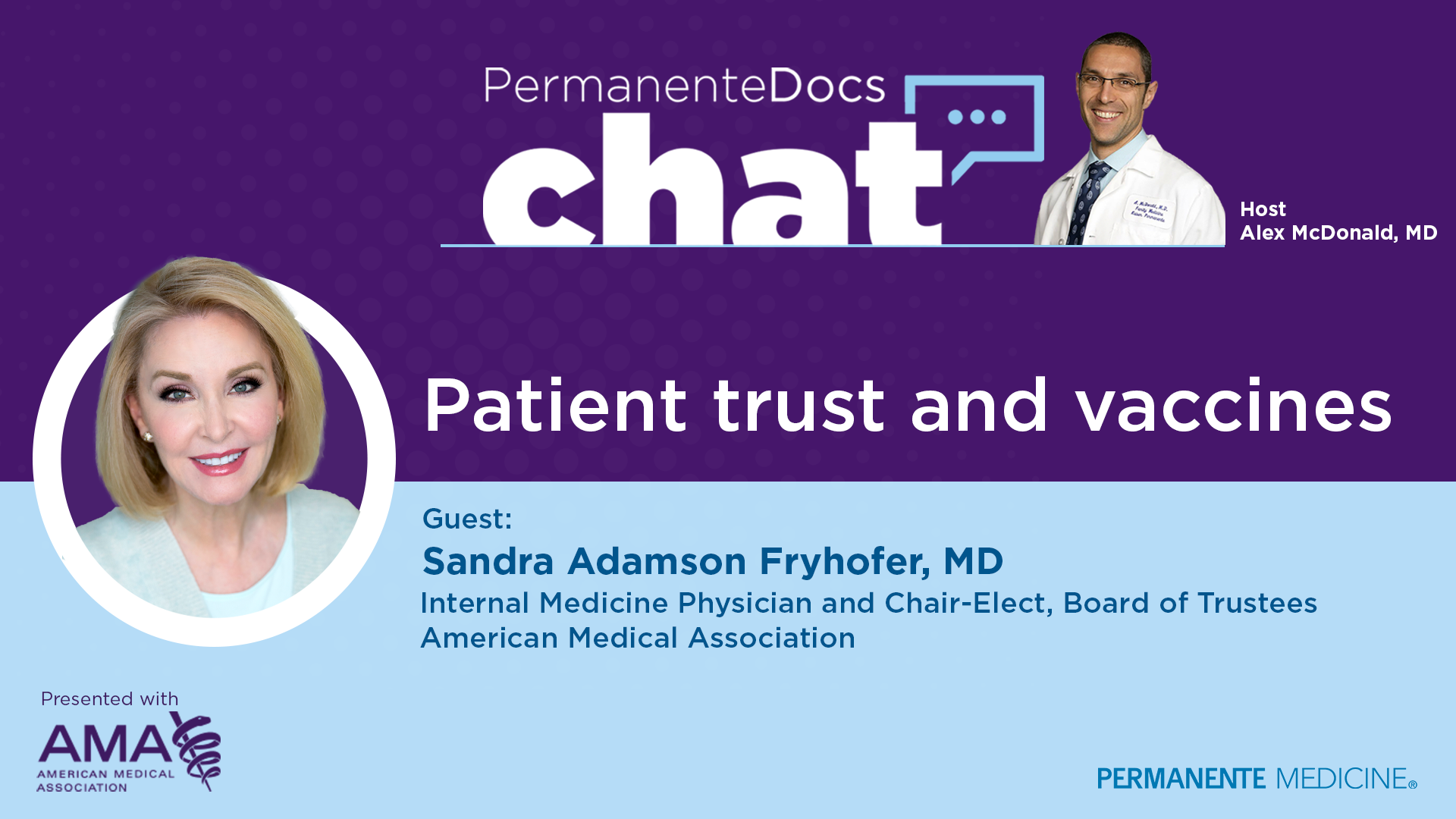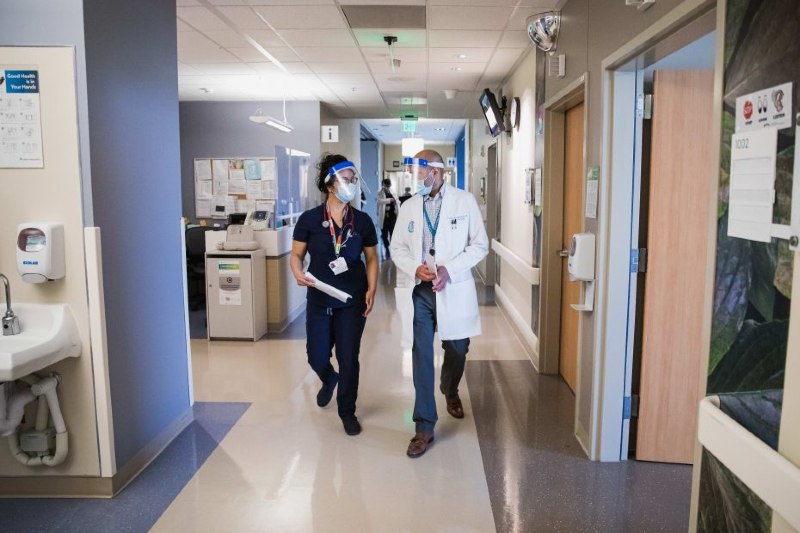PermanenteDocs Chat podcast on flu, COVID, and RSV vaccine safety and effectiveness updates with Sandra Fryhofer, MD, of the American Medical Association.

Leading with a long-term, connected strategy
Honoring the past, caring for the present, and assuring an enduring future

The health care industry is experiencing one of the greatest periods of change in more than 100 years. The challenges of the COVID-19 pandemic have accelerated this transformation. As one of the nation’s leading health care organizations, Kaiser Permanente is learning, evolving, and innovating in real time at the forefront of this historic change.
New information about COVID-19 and its impact on our society and our organization reveals itself every day, meaning we must be ready to respond and react to whatever comes our way. My mantra has become, “We make the best decisions we can with the best information we have today, and when we have new information tomorrow, we will make new decisions.”
In the midst of our ongoing demands and challenges, and even as we enter the holiday season seeing worrisome travel trends and dramatic increases in COVID-19 infection rates across the country, I still find bright spots that encourage and fortify me because of our approach. Over the past few months, I have written and spoken about some of our key learnings as an organization as a result of COVID-19. Three stand out:
- That even as a large, complex organization, we can be nimble and react quickly.
- The acceleration of the acceptance of telemedicine by our patients, physicians, and staff.
- The power of the teamwork, selflessness, and interdependence that has been exhibited by our people.
Leading with a long-term, connected strategy
Our resilience is a direct result of working for an organization that is grounded in its mission, vision, and values. I have spent my entire career honoring and adhering to these foundational beliefs, and, for the past 9 years, I have had the privilege of leading and upholding Kaiser Permanente’s long-standing commitment to practicing high quality, affordable, equitable, ethical, accessible, and compassionate health care.
Our ability to adapt, pivot, innovate, and care for one another doesn’t happen by luck or chance. It is the result of intentional culture work that supports and amplifies our solid foundation. That intentionality also leads to the creation of a long-term, multiyear, connected strategy that is adaptable, flexible, and stays true to our core values. My job — as is that of any leader — is to prepare for and lead through challenges and inflection points that have affected us; to capitalize on opportunities that exist and, where those opportunities don’t exist but need to, to create them.
Our mission, vision, and values don’t change but our tactics must change to reflect our ever-changing reality. At no time has this been more critical as we face ongoing uncertainty and volatility. Change is never easy, and there has been hardship, burnout, trauma, and pain. I do not want to make light of that or discount the toll this year has had on so many of us. But it also gives us an opportunity to challenge assumptions and look for new ways of doing things that will lead to meaningful, lasting, transformative change for the future of health care.
Importantly, it is our responsibility to ensure we are not only caring for our members, patients, and communities now, but that we are positioning our organization to be here to provide care for generations to come — that is the ultimate long-term benefit of a long-term strategy. I resonate so strongly with the Iroquois Nation Seventh Generation philosophy that we must make decisions today that assure a sustainable world 7 generations from now.
A long-term strategy relies on dedicated people
A leadership philosophy is important, but it is only words on a page if you don’t engage, empowered to support your people. That is the only way we can deliver on our mission and why a key component of my long-term strategy has been to prioritize a culture that’s compassionate, honest, respectful, inclusive, equitable, and collaborative. It is not easy and again requires intentionality, focus, commitment, humility, and constant nurturing. All of which have been especially important as we’ve been navigating the pandemic.
I remain eternally grateful and humbled by our physicians, staff, and all team members who give so much of themselves every day.
One meaningful example comes from San Bernardino County, one of our most COVID-impacted areas in Southern California. Our San Bernardino team reached out to other areas of our organization for support as their cases of COVID-19 climbed. Within minutes of the request, multiple medical center leadership teams responded offering assistance and leaning in however they could. It is moments like these that demonstrate the value of a strong foundation, a strong culture, a commitment to interdependence, and a selfless spirit focused on our higher purpose: working together to provide the best care to our patients and supporting each other.
I will be retiring at the end of this year, but I know Kaiser Permanente will continue to successfully navigate uncertainties precisely because of all the faithful stewards of our organization. We have created these long-term, connected strategies supported by an intentional culture so that we can meet any challenge head-on.
We are so fortunate to have incredibly dedicated, passionate physicians, caregivers, and health care team members who honor our past, and who work together to innovate and adapt to provide the best possible care to patients today and ensure we will be here to care for patients for generations to come.
I remain eternally grateful and humbled by our physicians, staff, and all team members who give so much of themselves every day. To those who came before us, those who continue to give their all each and every day, and those who are learning from us and will pick up where we left off, I thank you.
Edward M. Ellison, MD, is executive medical director and chairman, Southern California Permanente Medical Group; and chairman and chief executive officer, The Southeast Permanente Medical Group. He also serves as co-chief executive officer, The Permanente Federation, the leadership organization for the 8 Permanente Medical Groups whose more than 23,000 physicians serve more than 12.4 million Kaiser Permanente members and patients across the United States.

